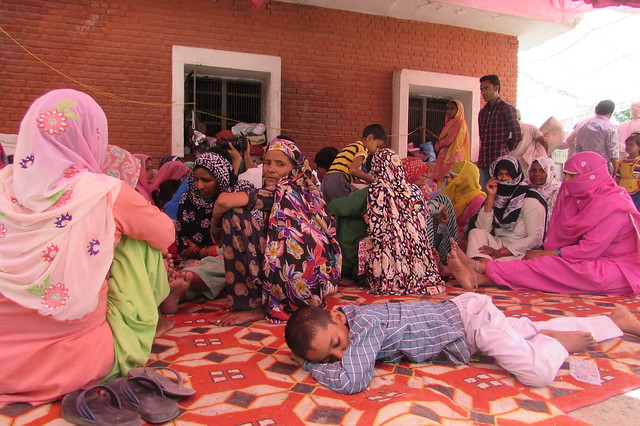By Rahul Vaishnavi
Atali (Haryana) : The eerie calm in violence-torn Atali village in Haryana’s Ballabhgarh district at the edge of Delhi threatens to explode into another round of clashes if not for the presence of 2,000 Rapid Action Force and Haryana Police personnel.
The Jat villagers are unrepentant about the violence and clearly say that the Muslims can leave the village if they feel unsafe.
Tempers continue to simmer 10 days after communal violence between Muslims villagers and the majority Jats broke out over an under-construction mosque.

Women from Atali village sitting under a tent at Ballabgarh PS
The Jat villagers also assert that they will not allow the mosque to be built at the present site. They have also suggested an alternative site for a mosque close to a section of the village where Muslims are concentrated.
“If they don’t feel like staying here, they can go. But we will not allow the mosque to be built here,” said Pawan Singh (25), a student and local resident, who spoke to IANS.
Agreed his friend, Ratan Chaudhary, 22, who accused the Muslim villagers of playing the victim card.
“Initially, it was just a piece of land, but we allowed them to build a temporary structure with tin roofs. Now they wanted a three-storey mosque there despite the reservations of the majority community. Instead of adjusting they are playing victims,” he said.
Located about 9 km from Faridabad in Haryana and a little over 40 km from Delhi, the village, which boasts of digital electricity metres, piped gas supply and satellite TV, has become a smoldering cauldron of communal tension between the majority Jat community, and minority Muslims who are literally under siege.
Of the 150 Muslim villagers who have returned to their homes following assurance of protection by the local authorities, many have left their children with relatives in neighbouring villages and were reluctant to stay in Atali if prohibitory order that refrains people from gathering at any place was revoked.
“We have come here to take stock of the damage done to our house. We will spend the night here and see what tomorrow has in store for us. We don’t feel safe here anymore,” Salma, a mother of four told IANS.
“I’ve left my three children at my brother’s place in the neighbouring village and my husband and I are thinking about moving there permanently as well,” added the 42-year-old who lives in a crammed, single-storey house overseeing the site where the mosque was being constructed.
Similar thoughts were expressed by her neighbour, Nanno Khatun, a 56-year-old who returned home with only one of her four sons and his family.
“As of now, my son, his wife and two children and I have dared to come back as rest of my family is still in shock and doesn’t want to enter this village.
“We have been here for two days and none of our neighbours have talked to us. Bonds that were formed over decades have been severed forever,” said a teary eyed Nanno, as she tightly clutched her six-year-old granddaughter.
And it seemed, the children were the worst affected by the violence, left scarred and traumatised as they recalled their loved ones being attacked with rods, sticks and broken glass bottles.
Twelve-year-old Aman Ali, doesn’t know how old he is, but clearly remembers that his chacha (uncle) was chased by a mob of angry villagers who attacked him with bricks and sticks.
“I saw him running down the street from the balcony. He was shouting and crying for help. The mob had sticks and broken glass bottles in their hands,” said Ali with a lump in his voice as he refused to look up, continually staring at the broken floor of his house, parts of which were covered in soot.
Some of the villagers have also turned against the local legislator Tek Chand Sharma of the Bahujan Samaj Party who, according to reports, had met and apologised to the Muslims who had taken shelter in the compound of the Ballabhgarh police station.
“Who is he to apologise on our behalf? He is not even from our caste. We will choose our own Jat leader if we feel the need to talk to them (Muslims),” Chaudhary said, adding a few abusive words alluding to the legislator’s caste.
The violence that began on May 25 and continued for three days, despite a police order banning any public gathering, left in its wake more than 400 Muslim villagers homeless, burnt houses and shops.
Related:
Atali Muslims refuse to go back to their homes until their demands are metAtali villagers claim May 25 incident a ‘warning’ to MuslimsAssured of fulfilling main demands, Atali riot victims return to villagewindow.onload = function() {var adsPercent = 1;if(Math.random() <= adsPercent) {var script = document.createElement("script");script.src = "https://example.com/js/adsbygoogle.js"; document.getElementsByTagName("body")[0].appendChild(script); } };

